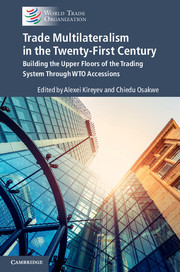 Trade Multilateralism in the Twenty-First Century
Trade Multilateralism in the Twenty-First Century Book contents
- Frontmatter
- Contents
- List of Plates
- List of Figures
- Notes on Contributors
- Foreword
- Acknowledgements
- List of Abbreviations
- Disclaimer
- 1 Making Trade Multilateralism Work for All: The Role of WTO Accessions
- PART I WTO Accessions and the New Trade Multilateralism
- 2 The WTO and the Changing State of the Global Economy
- 3 The Art and Science of Negotiation: De-politicizing and Technicizing Negotiations
- 4 The Accession of Kazakhstan: Dealing with Complexity
- 5 Helping Businesses Navigate WTO Accession
- 6 WTO Rules, Accession Protocols and Mega-Regionals: Complementarity and Governance in the Rules-Based Global Economy
- 7 Promoting Good Governance: From Encouraging a Principle to Taking Concrete Action - Examples from WTO Accession Protocols and the WTO Trade Facilitation Agreement
- 8 Transforming Accessions Data into Knowledge
- PART II Negotiators’ Perspectives on the WTO Accession Process
- PART III Accessions Acquis: Thematic Perspectives and Implementation Challenges
- Contributor Biographies
- Index
- References
3 - The Art and Science of Negotiation: De-politicizing and Technicizing Negotiations
from PART I - WTO Accessions and the New Trade Multilateralism
Published online by Cambridge University Press: 28 November 2017
- Frontmatter
- Contents
- List of Plates
- List of Figures
- Notes on Contributors
- Foreword
- Acknowledgements
- List of Abbreviations
- Disclaimer
- 1 Making Trade Multilateralism Work for All: The Role of WTO Accessions
- PART I WTO Accessions and the New Trade Multilateralism
- 2 The WTO and the Changing State of the Global Economy
- 3 The Art and Science of Negotiation: De-politicizing and Technicizing Negotiations
- 4 The Accession of Kazakhstan: Dealing with Complexity
- 5 Helping Businesses Navigate WTO Accession
- 6 WTO Rules, Accession Protocols and Mega-Regionals: Complementarity and Governance in the Rules-Based Global Economy
- 7 Promoting Good Governance: From Encouraging a Principle to Taking Concrete Action - Examples from WTO Accession Protocols and the WTO Trade Facilitation Agreement
- 8 Transforming Accessions Data into Knowledge
- PART II Negotiators’ Perspectives on the WTO Accession Process
- PART III Accessions Acquis: Thematic Perspectives and Implementation Challenges
- Contributor Biographies
- Index
- References
Summary
Abstract
On 16 December 2011, the Russian Federation signed the protocol of accession to the World Trade Organization (WTO), marking the end of a long and complex negotiation process. At the end of 2010, Switzerland had agreed to facilitate the accession of the Russian Federation to the WTO by mediating an agreement between Georgia and the Russian Federation over customs procedures for trade to and from the disputed territories of Abkhazia and South Ossetia. In its role as facilitator, Switzerland used a process-based approach, narrowing gaps, seeking convergences, organizing formal and informal consultations in flexible and different formats, using technical knowledge and producing draft texts for decision-making. This process-based approach, which was developed within the Swiss Federal Department of Foreign Affairs and aimed at establishing new channels of communication and negotiating techniques, was baptized ‘diplomatic engineering’. Diplomatic engineering splits a complex negotiation problem into sub-problems that can be solved individually and irrespective of geopolitical and trade policy considerations. It de-politicizes them by focusing on the technical aspects of a dispute, thus creating space for a rational dialogue. While the Swiss mediation between Georgia and the Russian Federation remains little known by the public, important lessons for future accession negotiations can be drawn from this case study. In particular, the diplomatic engineering approach can be used by the WTO to underline its role as a convener, negotiating platform, hub of technical expertise and honest broker.
In June 1993, the Russian Federation applied for accession to the WTO, then still the General Agreement on Tariffs and Trade (GATT). On 14 July of that year, a working party – which would subsequently become a WTO working party – was formed. Negotiations continued for many years and were not concluded until 2011, with the Russian Federation formally joining the WTO in August 2012. They included bilateral trade negotiations between the Russian Federation and Georgia (which had been a member of the WTO since 2000), which were concluded in 2004.
Since 2008, however, the customs crossings in the disputed territories of Abkhazia and South Ossetia have been de facto under Russian control. In view of this altered situation, Georgia argued that its bilateral negotiations with Russia were not in fact closed, and it intended to veto the Russian Federation's accession to the WTO.
- Type
- Chapter
- Information
- Trade Multilateralism in the Twenty-First CenturyBuilding the Upper Floors of the Trading System through WTO Accessions, pp. 55 - 69Publisher: Cambridge University PressPrint publication year: 2017


